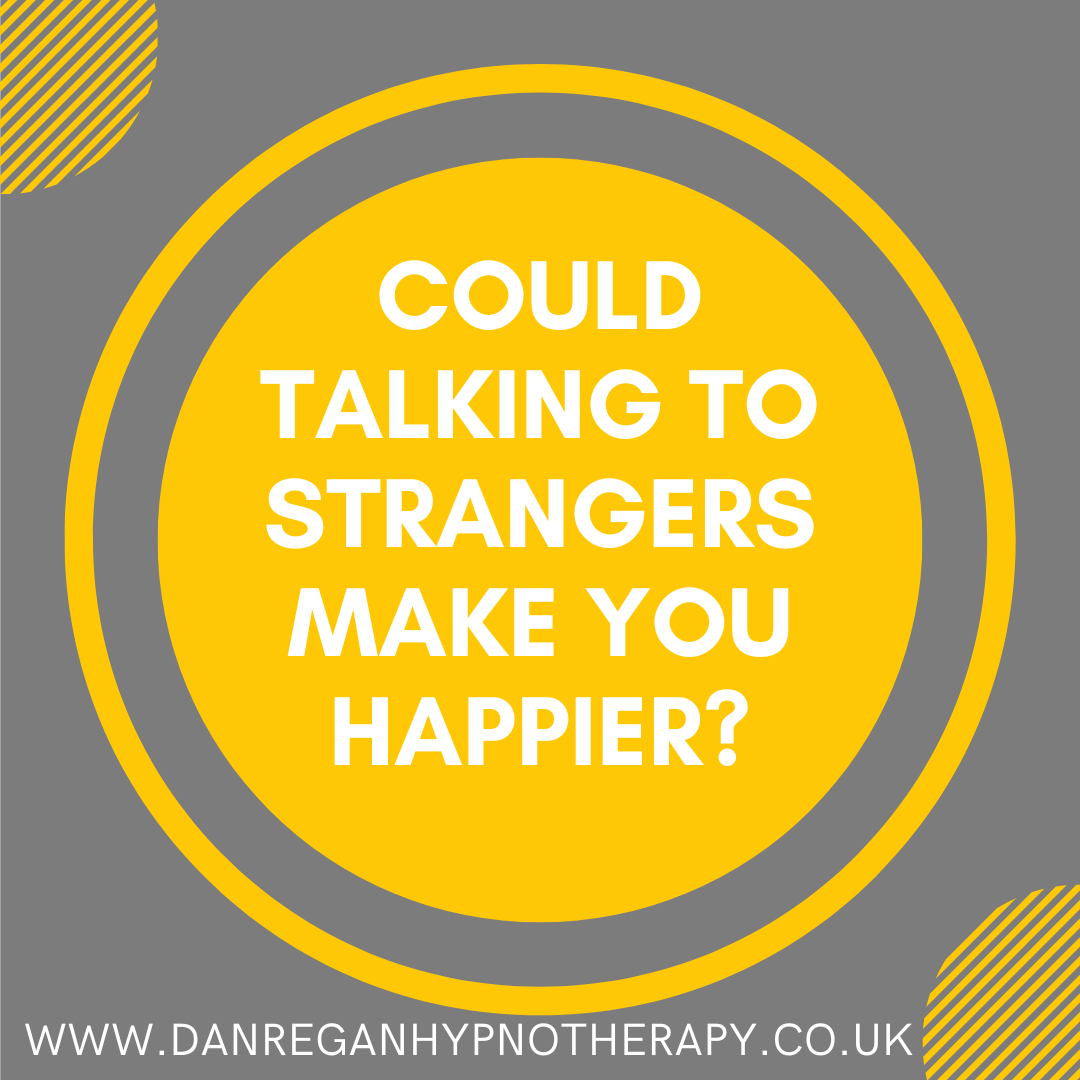Required
Could Talking To Strangers Make You Happier? Hypnotherapy in Ely and Newmarket
Could Talking To Strangers Make You Happier? Hypnotherapy in Ely and Newmarket
Could talking to strangers make you happier?
That is, if you want to feel happier, could proactively starting up conversations with strangers help you to boost good feelings?
Naturally, if you want to get better at connecting with others, then it makes sense to start engaging more in conversation and to go about deliberately seeking opportunities to chat. The more you do it, the more comfortable it becomes and the more relaxed in yourself you will be.
For others, their confidence and self-esteem can get in the way of doing this. Yet, it may that by getting over any general reluctance to talk to strangers, and by ditching any worry about what they think or of failing and looking stupid, may help contribute to your overall levels of happiness and enjoyment of life.
Routinely, we often ignore strangers who are close by and around us. We put our heads down, stare at a book or a screen, and stay rooted in our own space and comfort zone. Even when we may like the idea of engaging and chatting, we often hold back and the moment passes. And, of course, sometimes solitude and space can be nice. It can be enjoyable to have some time to not have to think or engage or talk. Yet research suggests that interacting and connecting with others can be a positive experience (for you and for them), even if we mistakenly expect that not socially engaging will be the more likely to make us feel better.
So what does the research say about talking to strangers? And what might be getting in the way of us all being more social with strangers and taking these regular opportunities for boosting our own well-being and happiness?
Social Interaction Versus Solitude
Recently I headed over to Cardiff by train to collect my Mum and bring her over to Ely in her car. Now, with four changes on the train journey, there wasn’t a lot of time to interact with anyone or enjoy some quiet time or to do anything but check the train times and rush from one platform to another. Yet once on the London Paddington to Cardiff train I could get comfortable, sit back and relax and just let the train carry me all the way back to Wales.
Being honest, I like a nice bit of solitude. As an introvert, too much social interaction can quickly wear down my battery and leave me needing to recharge my energy levels. With the constant interactions at work, when exercising and at home, sometimes some time to let my mind wander, to just pause and think, or to read and contemplate, can seem like a bit of a pleasure. I love interacting with others, but I need to keep the balance if I want to be at my best.
Taking a train journey is one of those situations where you can often notice how little strangers interact with each other. On the platform people stare at nothing, stare at the screen with train times or look at their mobile screen and scroll through whatever. On the train the same happens, and many people just keep to themselves and stick their headphones in. And, of course, that’s all fine because no one has to interact at all if they don’t want to (although why you perhaps should do so more often is covered below).
I really enjoyed sitting on the train, reading my book and, as my trip was to bring my mum to live over this side of the country, reminiscing about when I used to regularly get the train home from university or when I first moved to Cambridgeshire. In the busyness of everyday life it’s hard to find time just to reminisce and reflect, so I made the most of it as we approached Cardiff City Centre (which, despite many trips to Wales in recent years, I hadn’t been into for many years).
Now, Cardiff has changed so much since my last visit and is looking awesome (I’m biased but it is definitely one of the best cities ever!). And within two minutes of stepping off the train I bumped into an old work colleague from over fifteen years previously, who just happened to be passing. Such a strange coincidence, and such a positive experience to stand in the sun in the street and chat about things. The pleasure of unexpected positive social interactions!
This also happened to be the day that the King Charles was making his first trip (as King) to Cardiff so the police and people were out and about (although it was quieter that when Wales play a home rugby game!). I stopped to chat to some other spectators and I hung around to watch the new King drive past…
The King had been having a reception (or something like that) in the awesome Cardiff Castle:
Yet, this weekend was also a time for some reminiscing and mind wandering before my connections with my childhood home and village came to an end. It was a time to think back and look forward. It was a personal time where solitude was the order of the day. I took the opportunity to do a nine mile walk that took me up through the disused railway line we played on so much as kids (we used to spend hours in and around these trees and paths!).
Then is was up through the forest we used to hike through and which I now wish I’d wandered through even more regularly over the years:
And up to my favourite spot in the world, high up on the end of the hill. I sat there on the end of the hill, looking out over Cardiff and the surrounding places, and just enjoyed some time thinking back on old experiences and friendships and things that had been part of my life in this area over so many years. Sitting on the edge of this hill has to be my favourite spot in the whole world, it’s a beautiful place in nature.
Ah, I miss the old village and hill already!
And so for me, the balance of everyday social interactions and time for solitude and thought, are both equally positive and both equally valuable for my own mental health and well-being. It’s about balance. The balance of social interaction, and the time for solitude and feeling comfortable in your own thoughts, feelings and interests.
I regularly, day to day, say hello to people I encounter in and around Ely, and often have small social interactions with strangers. Yet could it be that putting more focus onto these social interactions with others could create more positive experiences and happiness for us all?
Social or Solitude for Happiness?
Which brings me back to my original question, could proactively starting up conversations with the people around us help to boost good feelings and happiness levels? Can talking to strangers make you happier?
Routinely, perhaps habitually, maybe deliberately, I think most of us miss opportunities to connect with others around us. It could be while waiting in a queue in a shop, when sitting on the train or bus, in a waiting room at the dentist or in some other environment where you are around people you don’t know. Rather than catch their eye, or pass a comment, you may sit there staring at the floor, put your head down and pretend you are occupied on something interesting over there or engulf your attention in mindless scrolling on your phone (perhaps even adding headphones to make it abundantly clear that you don’t wish to engage with anyone or anything except your screen).
As with my forest/hill walk, I totally get the joy of solitude and time alone. Having time to ourselves and to wander, look and think is a real luxury sometimes within our ever more busy lives and crowded brains (and, to be honest, on my walk there was no-one around anyway so it was either talk to the trees, talk aloud to myself or enjoy the tranquility of peace in nature).
Yet research suggests that interacting and connecting with others can be a positive experience, even if we mistakenly expect that not socially engaging will make us feel better.
As Epley and Schroeder (2014) comment, modern life offers many opportunities for connecting with others that are routinely allowed to pass by. People can sit millimetres apart while completely ignoring each other, despite the fact that feeling socially connected can increase happiness. They carried out research to understand why this happens, speculating that either solitude is a more positive experience that interacting with strangers in these situations, or people misunderstand the positive consequences of connecting with a stranger in conversation.
They, therefore, carried out a series of experiments to examine the experience of connecting to strangers. They had commuters on trains and buses (contexts where strangers come into very close proximity but almost never connect), either talk with a stranger near to them, remain disconnected and sit in solitude, or do whatever they would normally do on their commute. In both contexts, participants reported a more positive (and no less productive) experience when they connected than when they did not. Interacting with a stranger in these contexts was found to be a more positive experience that remaining in solitude.
In another experiment, they asked a separate group of people to predict what their experience would be in the same context (that is, on trains or buses, either interacting with a stranger, sitting in solitude or doing whatever they would normally do). They found that people’s expectation was that the opposite result would ensue, that remaining in solitude would be a more positive experience. People’s predictions of what would be most pleasurable conflicted with the results when people actually do talk to a stranger (rather that sitting in solitude).
This research suggests that people misunderstand the consequences of social interaction with strangers. They predict that they will have a more positive experience sitting in solitude than connecting with strangers. Yet, those who engaged with other people reported the opposite experience. This clearly suggests that one way you can boost your sense of well-being and happiness is to seek out these regular opportunities to deliberately chat with the people you don’t know around you.
What Stops You Talking To Strangers?
People expect social interactions with strangers to be less pleasant than remaining in solitude and so they do not engage and get the opportunity to experience and learn that it is, in fact, a more positive experience than expected.
The research above took a look at what could be stopping us all from engaging more with others, and found that this mistaken preference for solitude stems partly from underestimating others’ interest in connecting. We assume other people aren’t that interested in chatting and so we don’t take steps to engage with them (even if we might feel like we want to). This becomes self fulfilling because social norms (people routinely not engaging) suggests that people don’t want to engage, which means that people don’t engage, which means that you don’t get to discover that these conversations and connections can be more positive that predicted and expected. We don’t get the opportunity to learn, and to correct our beliefs, through experience. And in doing so, we miss out on the opportunity to increase our own well-being and happiness (and, from the research, to likely bring a positive experience to the person we talk to).
“This research broadly suggests that people could improve their own momentary well-being—and that of others— by simply being more social with strangers, trying to create connections where one might otherwise choose isolation” (Epley & Schroeder).
As well as the sense that others may not want to engage, that they may be busy or that it may seem rude to start to engage with them, there may also be another factor to this could be stopping you from initiating conversations with strangers or from comfortably engaging with them. Whenever I talk to someone with social anxiety, low confidence or low self-esteem, the fear of being rejected, saying something that will be judged negatively or just somehow coming across as a bit of an idiot, can form a major barrier to social engagements (whether with strangers, people at work or even sometimes with friends).
That worry about what other people might think, of being embarrassed or somehow failing, can seem like an impossible barrier to push past (of course, there are also those who find it easier to chat with people they may never see again because what does it matter what they think of you).
Just the thought of talking (or messing up) may be enough to lead to tension, sweating, going blank and worry. And the more uncomfortable you feel, the harder it becomes to start a conversation or to respond to one in a way that doesn’t make you feel awkward and like you want to sink right down into the ground and disappear (and which you may very well dwell on and replay afterwards in a way that makes you feel even more of a failure). I know that when I struggled with social anxiety, I would sometimes feel uncomfortable just in case someone tried to start a conversation with me and I would worry about going blank or saying something idiotic that would lead the person (and anyone else who happened to overhear me) to judge me. And, as anyone who has experienced anxiety around others knows, the anxious feelings and going blank just make the whole thing feel worse.
Of course, anxiety, social anxiety, low confidence, low self-esteem and so on can all be overcome with hypnotherapy and psychological techniques and strategies to calm your feelings, take control over your thoughts and to feel more comfortable in your own skin.
And, helpfully, the science and evidence tells us that those worries about what people may think about you are exaggerated in your mind and are often plain false.
We all tend to believe that people take more note of our actions and appearance than is actually the case (the spotlight effect). We tend to believe that we stand out in the eyes of others, both positively and negatively, more than we actually do. We largely overestimate how much attention others give to our actions and behaviours, and what we say and do. Our thinking is distorted, exaggerated and our perceptions misleadingly incorrect.
Fears about social rejection and being perceived negatively by others are largely misplaced or exaggerated inside our own minds, meaning the only thing stopping you from benefiting from interacting with others may be your seemingly real, yet erroneous, thinking patterns. People are way too busy in their own lives and in their own thoughts, needs and concerns to give that much attention to what you say and do in any meaningful way. The only one thinking all that anxious stuff and worrying what others think is you, and if you are the only one thinking it then it’s a bit pointless, so you may as well start imagining and making up some more helpful things in your own mind, right?
There’s lots more on this research and the spotlight effect in this article: Why You Should Probably Worry Less About What Other People Think About You – The Research on Fear of Failure and Being Judged
And not only that, but if things did go a bit awry in these interactions then the research and evidence tells us that people are generally much nicer that we expect, and don’t judge you as harshly as you might anticipate. Not only do you overestimate the extent to which others notice your actions and appearance, but you will also overestimate the extent to which others would judge you harshly if they did make some sort of embarrassing blunder or mishap. Most people simply don’t go around thinking bad stuff of everyone that comes their way, and if they really are that nasty and unpleasant, do you really care about their opinion anyway? Our perceptions, beliefs, expectations and our thinking can be simply wide of the mark in all these social areas. There’s more on this stuff here: Do Others Judge You As Harshly As You Think When You Mess Up? Anxiety & Fear of Failure
And finally, you may worry that you’ll feel a little anxious when you start your conversations with strangers and the worry that they will be able to tell that you are anxious can put your off taking action (and so mean you miss out on positive experiences). I’m guessing by now it won’t surprise you to know our minds can be off the mark here too. You can read more about this here: Can Other People Tell How You Feel? Anxiety About Looking Anxious
Your Well-Being and Happiness
Despite being social animals, we tend to mistakenly predict that solitude will be more positive than connecting and chatting with the people we don’t know and who we come into contact with. We misunderstand the consequences of social interaction with strangers.
And because, whether through habit or it seeming to be the social norm, we don’t engage with others, then we don’t get to experience it as a positive thing and we don’t learn the benefits to our own well-being (and that it is also a positive experience for the other person). We continue doing what we’ve always done and missing out on the opportunity to boost our own well-being and happiness for a while.
Now, of course, maybe sometimes the other person doesn’t want to engage and there may not be much you can do to influence that. You will, though, get to know that you tried and you can just shrug it off until the next opportunity arises. Yet that perceived barrier, that the other person doesn’t want to engage, may be wrong in itself as they also may not have had the opportunity to chat and experience the benefits, their predictions may still be that solitude will be better.
And if you are worried about what the other person thinks, about failing in some way, or being judged negatively, then we know that those thoughts and perceptions are exaggerated inside our own minds and are often erroneous.
But, of course, the only way to discover whether talking to strangers will be a more positive experience for you than not doing so, is to get out there and practice and practice. Seek out these regular opportunities to deliberately chat with the people you don’t know around you, and notice the benefits to your well-being and happiness. You can open up the chat talking bout the weather (a favourite British subject!), current affairs, something about the environment you are in or just about anything else. The research here suggests that you’ll be pleased that you took that chance to socially engage with someone in some way.
To your health and happiness,
Dan Regan
Anxiety Hypnotherapy in Ely & Newmarket
Struggling with anxiety, stress, worry and fear and need some help? Find out how I can help with a Complimentary Hypnotherapy Strategy Session. Learn more here: Appointments
Find out what dozens of other people have said after their hypnotherapy sessions with Dan: Hypnotherapy Testimonials
And check out these powerful hypnosis downloads that can start helping you right away with anxiety, confidence and more: Hypnosis Downloads
Reference: Epley, N. and Schroeder, J., 2014. Mistakenly seeking solitude. Journal of Experimental Psychology: General, 143(5), p.1980.
Get Your Copy Right Now…
Subscribe to Dan’s Digest filled with tips, strategies and techniques and get instant access to your free rapid relaxation hypnosis audio track.
Enjoy feeling and being more mentally calm and physically relaxed right now:











0 Comments